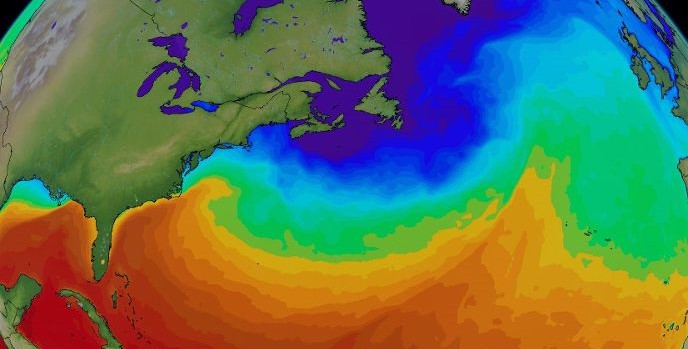The Gulf Stream is a powerful ocean current that plays a vital role in shaping the climate of the UK and much of Western Europe.
The Gulf Stream forms part of a larger system known as the Atlantic Meridional Overturning Circulation (AMOC), also known as the global thermohaline circulation, a vast oceanic conveyor belt driven by differences in water temperature and salt content.
Originating at the tip of Florida, the Gulf Stream is a warm and swift Atlantic Ocean current that travels along the eastern coastline of the United States and Canada. From there, it crosses the Atlantic Ocean towards Europe, transporting warm tropical waters northwards. This movement of heat is crucial in moderating the climate of regions far from the equator.
READ MORE: What is the Azores High?
How the Gulf Stream works
The Gulf Stream is driven by the density of seawater, which is affected by both temperature and salt content. As warm water flows from the equator towards the poles, it gradually cools. Evaporation along the way increases the salt content, making the water denser. This dense, cold water sinks deep into the ocean and begins a slow journey back towards the equator, several kilometres below the surface.
Eventually, this deep water is pulled back to the surface in a process known as upwelling, where it warms again and continues the cycle. This circulation ensures that the world’s oceans are continually mixed, distributing heat and energy across the globe.
Why it matters for the UK
The Gulf Stream’s influence on UK weather is profound. It helps maintain a temperate climate, supports marine ecosystems, and affects seasonal weather patterns. Changes in the strength or position of the Gulf Stream can lead to noticeable shifts in weather, such as colder winters or wetter summers.
READ MORE: Understanding convergence zones and the Intertropical Convergence Zone
Without the Gulf Stream, the UK’s climate would be significantly colder. The current brings warmth from the tropics, helping to keep winters milder than those experienced at similar latitudes elsewhere in the world. For example, cities in Canada at the same latitude as London often experience much harsher winter conditions.
Scientists continue to monitor the Gulf Stream closely, as it is sensitive to changes in global temperatures and ice melt. Any significant disruption to this current could have far-reaching consequences for the UK and beyond.
Understanding the Gulf Stream is key to predicting future climate trends and preparing for potential changes in our weather.
Keep up to date with weather warnings, and you can find the latest forecast on our website, on YouTube, by following us on X and Facebook, as well as on our mobile app which is available for iPhone from the App store and for Android from the Google Play store.



